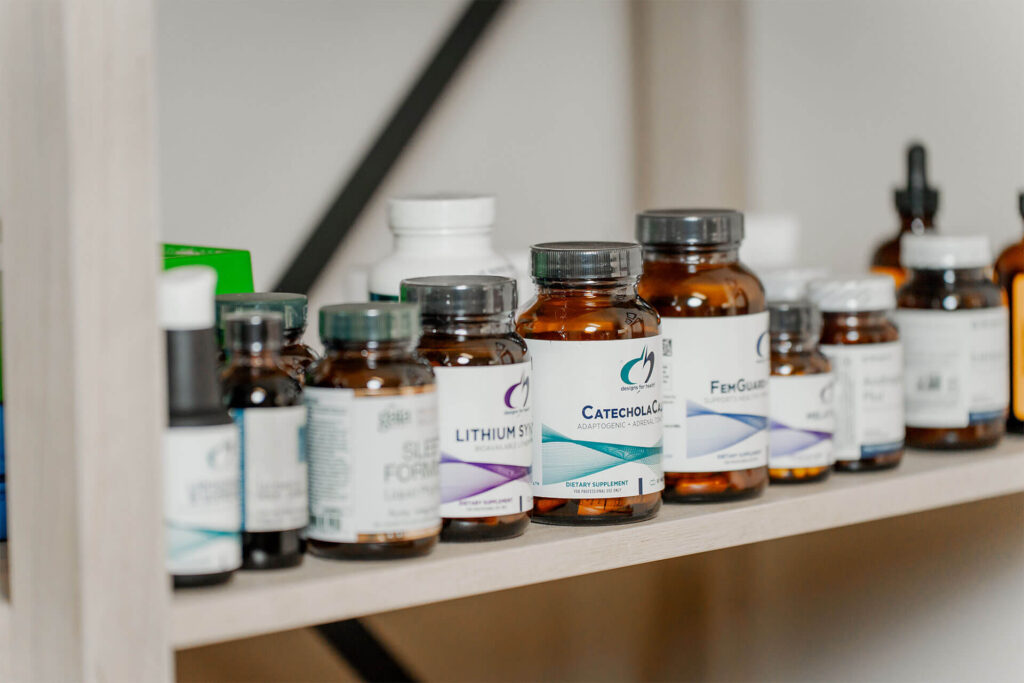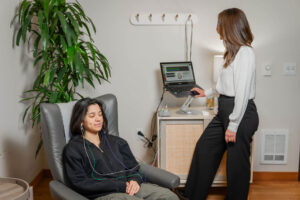In the intricate symphony of our bodily functions, the autonomic nervous system (ANS) stands as the conductor. It directs vital processes like heart rate, digestion, and the stress response. Attaining balance within the ANS isn’t just desirable; it’s paramount for overall well-being. In this guide, we explore researched supplements that can support and preserve this delicate balance.
1. Omega-3 Fatty Acids: Tackling Inflammation, Supporting the ANS
Source: Fish oil, flaxseed oil, chia seeds.
Research: Beyond their recognized cardiovascular benefits, omega-3 fatty acids have been explored for their anti-inflammatory effects. As inflammation disrupts ANS balance, these fatty acids act as natural soothers, tempering inflammatory responses and improving resilience. They have the potential to modulate the ANS reaction to stress. [Swanson et al., 2012]
Dosage: The American Heart Association recommends 1-2 servings of fatty fish per week. If using supplements, common recommendations are around 1,000 mg to 2,000 mg combined EPA and DHA per day.*
Explore our Omega-3 supplements.
2. Probiotics: Gut Health and ANS Communication
Source: Fermented foods (yogurt, kefir), probiotic supplements.
Research: Probiotics, known for promoting gut health, may influence the communication between the gut and the brain, potentially aiding in ANS equilibrium. [Bravo et al., 2011]
Dosage: Dosages may range from 1 billion to 100 billion CFUs per day. Choose a product with a variety of strains and a high number of colony-forming units.*
Discover our Probiotic supplements.
3. Adaptogens: Stress Response Modulation
Examples: Ashwagandha, Holy Basil.
Research: Adaptogens like Ashwagandha, and Holy Basil are known for modulating the stress response—a crucial aspect in ANS balance. [Panossian and Wikman, 2010]
Dosage: Adaptogenic herbs can vary. For example, Ashwagandha doses typically range from 300 mg to 600 mg per day.*
Explore our Adaptogen options.
4. Magnesium: The Unsung Hero in ANS Regulation
Source: Nuts, seeds, leafy greens, magnesium supplements.
Research: Often overlooked, magnesium plays a vital role in physiological processes. Its deficiency has been linked to heightened sympathetic nervous system activity, making magnesium supplementation crucial for ANS balance. [Boyle et al., 2017]
Dosage: Magnesium supplements may be taken at doses of 300 mg to 600 mg per day.*
Discover our Magnesium supplements.
5. L-Theanine: Calming Effects on Neurotransmitters
Source: Found in tea leaves (especially green tea).
Research: L-Theanine, found in tea leaves, has been investigated for its calming effects and influence on neurotransmitters, contributing to ANS stability. [Kimura et al., 2007]
Dosage: Studies often use doses ranging from 100 mg to 400 mg per day.*
Explore our L-Theanine offerings.
6. Vitamin D: Beyond Bone Health
Source: Sun exposure, fatty fish, fortified foods, vitamin D supplements.
Research: Vitamin D deficiency has been associated with ANS dysfunction. Maintaining adequate levels is crucial for overall health, including ANS function. [Kesby et al., 2011]
Dosage: The Recommended Dietary Allowance (RDA) for vitamin D varies by age and gender. For adults, it’s around 600 IU (15 mcg) per day. Higher doses of 2,000-4,000 IU or more per day, may be recommended for individuals with deficiencies or those living in northern latitude cities such as Seattle.*
Discover our Vitamin D supplements.
7. B Vitamins: Essential for Nerve Function and Energy Production
Source: Meat, fish, dairy products, eggs, legumes, B complex supplements.
Research: B vitamins are crucial for maintaining nerve function, energy production, and overall nervous system health. Deficiencies in B vitamins (common with vegan diets or those with MTHFR mutations) can lead to neurological issues and disrupt ANS balance. Ensuring an adequate intake of B vitamins through diet or supplementation is essential for supporting optimal nervous system function. [Gropper et al., 2017]
Dosage: Dosages of B vitamins can vary based on individual needs and health conditions. A balanced diet rich in B vitamin sources is recommended, along with supplementation if needed.
Explore our B vitamin supplements with our online dispensary.
Striving for autonomic nervous system balance is an attainable goal, supported by researched supplements. However, this journey requires caution and professional guidance. Consult with our healthcare professionals before incorporating these supplements into your routine, ensuring a tailored approach aligned with your specific health needs. Together, let’s explore the practical steps to nurture a well-balanced autonomic nervous system for optimal health.
Schedule a free 15-minute phone consultation with a doctor!
* Dosage Note: Specific dosages can vary based on individual needs and health conditions. Always consult with our healthcare professionals before starting or changing any supplement or drug. The dosages mentioned here are for informational purposes only and are not to be construed as medical advice. Please consult your healthcare practitioner for diagnosis and treatment.
NeuroLogic DOES NOT recommend discontinuing use of any medications or supplements that have been prescribed to you – whether by your doctor, psychologist, or other provider – or changing any care that has been recommended to you.
Visit our clinic for personalized guidance and explore our curated supplements.
References
- Swanson, D., Block, R., & Mousa, S. A. (2012). Omega-3 fatty acids EPA and DHA: health benefits throughout life. Advances in Nutrition, 3(1), 1-7.
- Bravo, J. A., Forsythe, P., Chew, M. V., Escaravage, E., Savignac, H. M., Dinan, T. G., … & Cryan, J. F. (2011). Ingestion of Lactobacillus strain regulates emotional behavior and central GABA receptor expression in a mouse via the vagus nerve. Proceedings of the National Academy of Sciences, 108(38), 16050-16055.
- Panossian, A., & Wikman, G. (2010). Effects of Adaptogens on the Central Nervous System and the Molecular Mechanisms Associated with Their Stress—Protective Activity. Pharmaceuticals, 3(1), 188-224.
- Boyle, N. B., Lawton, C., & Dye, L. (2017). The effects of magnesium supplementation on subjective anxiety and stress—a systematic review. Nutrients, 9(5), 429.
- Kimura, K., Ozeki, M., Juneja, L. R., & Ohira, H. (2007). L-Theanine reduces psychological and physiological stress responses. Biological Psychology, 74(1), 39-45.
- Kesby, J. P., Eyles, D. W., Burne, T. H., & McGrath, J. J. (2011). The effects of vitamin D on brain development and adult brain function. Molecular and Cellular Endocrinology, 347(1-2), 121-127.
- Gropper, S. S., Smith, J. L., & Carr, T. P. (2017). Advanced Nutrition and Human Metabolism. Cengage Learning.




